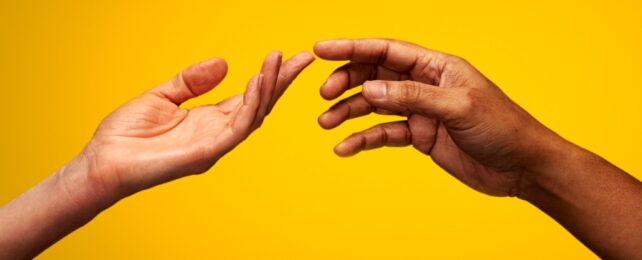You probably haven't spent much time thinking about how heavy your hands are – but if you had to make a guess, you'd probably be wrong.
A small study that asked people to compare their hands to various weights suggests that humans generally underestimate the mass of their hands by just over 49 percent.
A hand is estimated to weigh around 400 grams (14.1 ounces). And while that might not mean much to some of us, for people who wear and design prosthetics, it's actually a huge deal – many prosthetics users perceive their artificial limbs as too heavy, even though they're far lighter than an actual limb.
Importantly, this research provides a new method by which we can investigate how the brain perceives our body's weight, which we still know very little about.
The underestimation of our own mass is something the team behind the study from Birkbeck, University of London has called 'terrestrial weightlessness'.
"Our findings demonstrate that our everyday experience of body weight – weightedness – can be accurately quantified, and it is strongly underestimated," neuroscientist Elisa Raffaella Ferre, one of the lead researchers, explains.
Scientifically speaking, it's easy to tell how much an object weighs by multiplying its mass by gravitational acceleration.
But our perception of our weight isn't directly correlated to any specific sensory signals. So the research team set out to explore exactly how our brain determines that weight and the implications of it.
"Existing research on body weight has largely focused on the social or medical aspects of how people feel about the overall weight of their body," says PhD student and one of the researchers on the study, Denise Cadete.
"Surprisingly, no research has investigated the more basic issue of how the brain constructs representations of the weight of individual body parts."
To gain more insight, the team recruited 20 healthy adults and told them to relax their left arm on an armrest-like pillar. A screen covered the arm so participants couldn't see it throughout the experiment.
To start with, their left hand hung freely so they could sense the weight of it. But the researchers then supported their hands and added weight to their left wrist instead – starting with 100 grams and increasing gradually to 600 grams.
The participants were asked to judge whether their hands or the weight was lighter or heavier than their hands at each stage.
On average, they underestimated by 49.4 percent.
Seeing as the feeling of body weight is often linked to fatigue (just think of the phrase "my eyelids are heavy"), the researchers then had the participants squeeze a grip strength device for 10 minutes to tire out the hand before trying again.
Interestingly, once fatigued, people only underestimated their hand weight by 29 percent – so the more tired they were, the more they thought their hands weighed.
The team hypothesizes that this perception of weight could actually be a phenomenon that encourages us to get moving.
"We believe that perceived body weight could be an important component of a system that adapts with evolution to control our levels of behavior," says Cadete.
"A person's brain could either encourage or discourage physical exertion by making their body seem light and actions therefore effortless, or heavy and actions thus effortful."
This hypothesis is consistent with a recent study on an amputee who reported his prosthetic leg felt lighter once researchers had used intra-neural stimulation to make the limb feel more embodied.
"We investigated, for the first time, how the brain perceives the weight of body parts as spatially extended objects," says cognitive neuroscientist and one of the team leaders, Matthew Longo.
"Our work may have implications for the understanding of disorders of body weight, including anorexia nervosa and obesity."
The research has been published in Current Biology.
